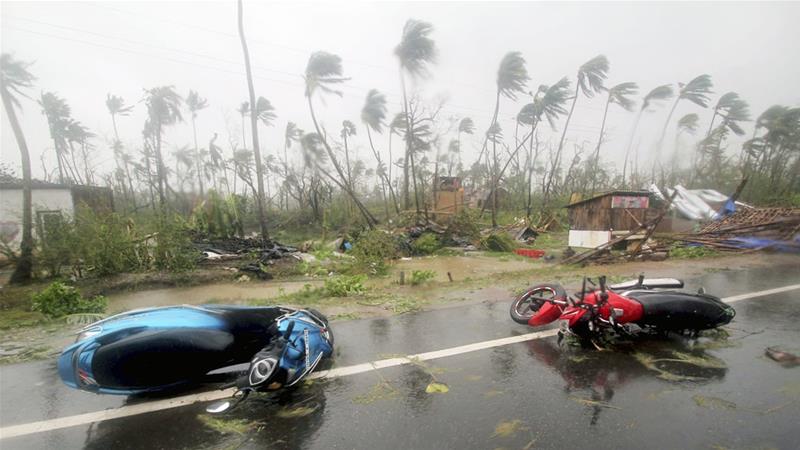Cyclone Fani, one of the biggest storms to hit the Indian subcontinent in decades, has barrelled into Bangladesh after leaving a trail of deadly destruction across the eastern coast of India.
At least 12 people died in Odisha, the worst-hit Indian state, the Reuters news agency reported on Saturday, citing the local Indian media.
Meanwhile, police in Bangladesh told AFP news agency that nine people perished even before the eye of the storm rumbled over the border on Saturday morning. The dead included a minor in Bangladesh’s Barguna district on the coast and five others killed by lightning.
Over a million people were moved to safety, Bangladeshi officials said.
“We are mooring our boat because it’s the only means of income for us. Only Allah knows when we can go back to fishing again,” Akbar Ali, a fisherman near the town of Dacope in Bangladesh, told AFP while battling surging waves to tie his boat to a tree.
With the storm weakening but still packing a punch, winds of up to 70km an hour and heavy rain battered the Indian state of West Bengal, including the Sundarbans mangrove forest area.
Reporting from New Delhi, Al Jazeera’s Scott Heidler said the priority for the Indian authorities is to reach the areas hit by the monster cycylone.
“The bigegst concern now is clearing the roads so that they can get to the communities that are cut off,” he said, adding that the hardest-hit areas are without electricity.
Heidler said there are also fears over Fani (“snake’s hood” in Bengali) triggering a heavy rainfall or storm surge along the eastern Indian coast.
“It’s a total mess in islands of the Sunderbans as the cyclone has destroyed everything in its path, fuelling fears rivers could burst their banks and leave vast areas underwater,” said Manturam Pakhira, Sunderbans affairs minister.
Mamata Banerjee, West Bengal’s chief minister and a key figure in India’s ongoing general election, cancelled all political rallies and set up an improvised control room in a hotel in the path of the storm.
Kolkata’s international airport was ordered closed. Train services were also halted.
Odisha state worst hit
Worst hit was the state of Odisha where Fani made landfall on Friday, packing winds gusting up to 200km an hour, sending coconut trees flying, knocking down power lines and cutting off water and telecommunications.
While not confirming any deaths, Odisha disaster management official Prabhat Mahapatra told AFP there were about 160 people injured in the Hindu pilgrimage city of Puri alone.
“It just went dark and then suddenly we could barely see five metres in front of us,” said one Puri resident.
“There were roadside food carts, store signs all flying by in the air,” the man told AFP. “The wind was deafening.”
As Fani headed northeast, Odisha authorities battled to remove fallen trees and other debris strewn over roads and to restore phone and internet services.
Electricity pylons were down, tin roofs were ripped off and windows on many buildings were smashed.
“Energy infrastructure has been completely destroyed,” Odisha’s chief minister Naveen Patnaik said.
Puri’s famous 12th-century Jagannath temple escaped damage, however.
The winds were felt as far away as Mount Everest, with tents blown away at Camp 2 at 6,400 metres and Nepali authorities cautioning helicopters against flying.
Ports have been closed but the Indian Navy has sent warships to the region to help if needed. Hundreds of workers were taken off offshore oil rigs.






 WhatsApp us
WhatsApp us 

